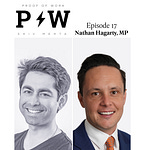Everything You Need to Know About Cryptocurrencies: Store of Value, Medium of Exchange, and Beyond
Bitcoin is widely recognized as a revolutionary store of value. With pension funds entering the Bitcoin ETF space and Switzerland even allowing tax payments in Bitcoin, its influence is growing. But what else can Bitcoin do? In this podcast, we go beyond the surface and explore its potential as a medium of exchange and even a unit of account.
In this episode, I sat down with Kunal Shah, the founder of Upsurge Club, to discuss the launch of our latest course, On-Chain Analysis for Cryptocurrency, and dive deep into the world of cryptocurrencies. Together, we explored Bitcoin’s current role in the global financial landscape, its future potential, and the broader implications of blockchain technology.
Bitcoin: A Modern-Day Gold?
Gold has long been considered a reliable store of value, but Bitcoin offers several advantages in a digital economy. Unlike gold, Bitcoin is portable, easily exchanged, and native to the digital space. The complexities of trading physical gold simply don’t exist with Bitcoin, making it a much more efficient medium of exchange. But how does it compare to traditional fiat currencies?
Bitcoin as a Unit of Account: More Than a Technical Problem
A common critique is that Bitcoin cannot function as a unit of account, but the issue lies more with regulatory environments than with Bitcoin itself. For example, in El Salvador, you can walk into a McDonald’s and pay with Bitcoin, showing that the cryptocurrency is usable as a unit of account in the right jurisdictions. It's a challenge for regulatory frameworks, not for Bitcoin's technology.
Predictable Inflation: A Key Advantage
Bitcoin's inflation rate is one of its most compelling features. Unlike fiat currencies, where central banks adjust monetary supply unpredictably, Bitcoin’s supply is fixed at 21 million, with halvings occurring every four years. This predictable inflation rate gives Bitcoin a significant edge in terms of monetary economics.
Global Adoption: Central Banks Are Taking Notice
Bitcoin’s stability has grown over time, to the point where it is less volatile than some major national economies. Countries like Oman have already invested heavily in Bitcoin mining, signaling the growing interest from Middle Eastern nations. Bitcoin is not just a speculative asset. It’s becoming part of the broader financial infrastructure. El Salvador holds Bitcoin as a reserve asset, and interest in Bitcoin across Africa and the Middle East continues to rise.
Blockchain Technology: The Broader Picture
It’s essential to distinguish between Bitcoin and blockchain technology. Blockchain, like AI or IoT, is a technology that can exist independently of cryptocurrencies. Companies like IBM and Amazon are already leveraging blockchain for projects without using any cryptocurrency. Blockchain’s real-world applications are vast, from supply chain management to financial auditing, proving its utility beyond the hype of digital tokens.
The Future of Bitcoin as a Reserve Asset
Bitcoin's future looks increasingly tied to central banks and financial reserves. Countries looking to diversify away from the U.S. dollar are eyeing decentralized assets like Bitcoin. This trend is only likely to grow as more nations explore Bitcoin’s potential in their financial strategies.
Key Takeaways from My Conversation with Kunal Shah:
Bitcoin is solidifying its role as a store of value, but its potential as a medium of exchange and unit of account depends heavily on local regulations.
Its predictable inflation rate sets it apart from fiat currencies, offering a stable, transparent alternative.
Countries like Oman and El Salvador are early adopters, and more regions may follow suit.
Blockchain technology is separate from cryptocurrency and has multiple use cases across industries without requiring a token.
Where to find Kunal Shah and Upsurge Club:
Website: Upsurge Club
Youtube: Investing With Upsurge
LinkedIn: Connect with Kunal
In this episode we covered:
00:00 Preview
00:55 Introduction
01:40 History and Evolution of Cryptocurrencies
08:27 Cryptocurrency vs. Traditional Currency
14:22 What If Crypto Takes Over Traditional Currency?
16:05 Differentiating Crypto, Bitcoin, and Blockchain
20:10 How Will Volatility in Crypto Be Managed?
24:02 Understanding Crypto Mining in Detail
27:38 Incentives in Mining
30:48 Bitcoin Number and Supply
32:14 BTC Mining vs. Other Crypto Mining
33:36 Understanding Proof of Work and Proof of Stake in Crypto Mining
34:35 Understanding the Supply of Ethereum
38:10 Other Popular Cryptos
41:05 Shiv's Sources of Learning About Crypto
43:00 Security Concerns With Crypto
44:43 Conclusion
Disclaimer:
The information provided by Insight Labs is for educational purposes only. It is not intended to be, and should not be taken as, legal, tax, investment, financial, or any other form of professional advice.












Share this post